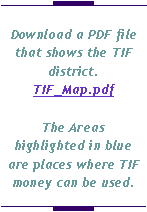
|
Elect Tom McMasters Huber Heights City Council |
|
Succeeding in Huber Heights |


|
TAX INCREMENT FINANCING: GENERAL PURPOSE (PARCEL)
Tax Increment Financing (TIF) is an economic development mechanism available to local governments in Ohio to finance public infrastructure improvements and, in certain circumstances, residential rehabilitation. A TIF works by locking in the taxable worth of real property at the value it holds at the time the authorizing legislation was approved. Payments derived from the increased assessed value of any improvement to real property beyond that amount are directed towards a separate fund to finance the construction of public infrastructure defined within the TIF legislation. Local governments may authorize TIFs to fund a number of infrastructure needs including public roads and highways, water and sewer lines, remediation, land acquisition, demolition, the provision of gas, electric, and communications service facilities, and the enhancement of public waterways (note – public infrastructure does not include police or fire equipment).
The value of real property improvements are exempted from taxes through local TIF authorizing legislation enacted by the municipality, township, or county. A taxpayer whose operations are located within a TIF continues to make payments to the jurisdiction in an amount equal to the real property tax liability that otherwise would have been due had the property not been exempted. These payments in lieu of taxes, or Service Payments, are collected by the county treasurer in the same manner as real property taxes, but are deposited into separate public improvement tax increment equivalent funds.
ELIGIBILITY
A TIF is legislatively created upon a declaration by a municipality, township, or county that private improvements to one or more parcels of real property within their respective jurisdictions serve a public purpose. Private improvements may include the construction, expansion, and demolition of buildings, remediation, or other forms of site development. Residential projects are generally not eligible for TIF unless located within a blighted area of an impacted city. A private improvement under construction that has not yet been assessed for the purposes of real property taxation may be eligible. The local jurisdiction should examine the relevant provisions of the Ohio Revised Code (O.R.C.) prior to making a determination (see §§ 5709.40-5709.43 of the O.R.C. for municipalities; §§ 5709.77-5709.81 for counties; and §§ 5709.73-5709.74 for townships). Some tax redirection capability also exists within Chapter 725 of the O.R.C. (Urban Renewal) and Chapter 1728 (Impacted Cities). Note that the scope of a project’s eligibility may be expanded for municipalities utilizing TIF authority granted under 5709.41
TAX BENEFIT
A local political jurisdiction may exempt from real property taxes the value of private improvements up to 75 percent for a term of up to 10 years. Local governmental bodies seeking to offer greater amounts of assistance under the TIF must first obtain the concurrence of the affected board(s) of education. With the concurrence of its school board(s), a local political jurisdiction may exempt the value of improvements up to 100 percent for a term of up to 30 years. The TIF authorizing legislation enacted by the municipality, township, or county must specify the rate and term of real property tax exemptions.
SCHOOL BOARD INVOLVEMENT
Exemptions granted through TIFs limit the amount of revenues available to school boards of education. State law therefore requires that local political jurisdictions notify, and in some cases obtain the concurrence of, affected school boards prior to enacting TIF authorizing legislation. Municipalities, townships, and counties are required to notify all affected boards of education at least 14 calendar days prior to their formal consideration of proposed TIF legislation. If the TIF proposes an exemption greater than 75 percent or a term in excess of 10 years, local governmental entities must provide notice specifically to the affected city, village, and exempted school boards at least 45 business days prior to their formal consideration. State law provides that the school board notification include the specific parcels or Incentive District boundaries comprising the TIF, the estimated value of the real property improvements, and the exemption benefit levels.
The affected boards of education must either approve, conditionally approve, or reject any proposed exemptions in excess of the statutory rate and term limits. Approval by the affected school board(s) is not required for a municipal TIF in the event the local jurisdiction secures a commitment from the taxpayer to remit Service Payments directly to the affected school board(s) in an amount equal to what would have been paid if the improvements had not been exempted. Note that State law allows a board of education to (a) waive their rights to approve proposed TIF exemptions, or (b) grant local governmental entities the ability to provide notice in fewer than 45 business days in applicable circumstances. After the appropriate notice to the affected board(s) of education, the local jurisdiction must formally approve the TIF legislation in an open public meeting.
In those municipalities that levy their own income taxes, if the respective project receiving assistance generates annual payroll for new employees of $1,000,000 or more, legislatively authorized TIFs must be accompanied by revenue sharing agreements with the affected city, village, and/or exempted school board(s). If a municipality and its above mentioned school board(s) fail to execute an acceptable compensation agreement within six months following the passage of the TIF legislation, State law mandates that the municipal income tax revenues generated from the new employees be divided on a 50/50 basis between the two parties. This arrangement must occur in each year that the TIF is in effect and the statutory payroll threshold is satisfied. Given the requirement that income tax revenues are shared with the affected board(s) of education, municipalities must collect employment and payroll information regarding the project prior to enacting the TIF legislation and annually monitor such project data.
|

